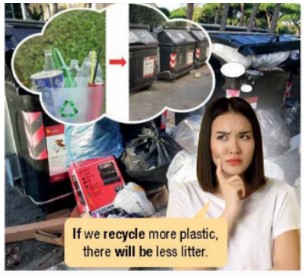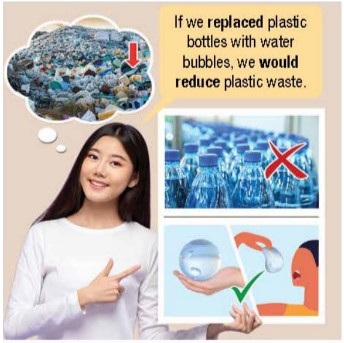a. Listen and repeat. (Nghe và lặp lại.)

If we recycle more plastic, there will be less litter. (Nếu chúng ta tái chế nhiều nhựa hơn, sẽ có ít rác hơn.)
First Conditional (Câu điều kiện loại 1) Meaning and Use (Ý nghĩa và Cách sử dụng) We can use First Conditional to talk about things we can change (“If I do this thing…”), and the future result of that change (“...that thing will happen”). (Chúng ta có thể sử dụng Điều kiện loại 1 để nói về những thứ chúng ta có thể thay đổi (“Nếu tôi làm điều này…”) và kết quả trong tương lai của sự thay đổi đó (“… điều đó sẽ xảy ra”). If I study hard, I will do well on my test. (Nếu tôi học tập chăm chỉ, tôi sẽ làm tốt bài kiểm tra của mình.) |
Form If we recycle more plastic, there will be less litter. (Nếu chúng ta tái chế nhiều nhựa hơn, sẽ có ít rác hơn.) There won't be as much trash if we ban single-use plastic. (Sẽ không có nhiều rác nếu chúng ta cấm đồ nhựa dùng một lần.) If we don't protect the environment, what will happen? (Nếu chúng ta không bảo vệ môi trường, điều gì sẽ xảy ra?) Will we reduce air pollution if we ban cars? (Chúng ta sẽ giảm ô nhiễm không khí nếu chúng ta cấm ô tô?) (Yes, we will. (Có, chúng tôi sẽ.) /No, we won't. (Không, chúng tôi sẽ không.)) |





